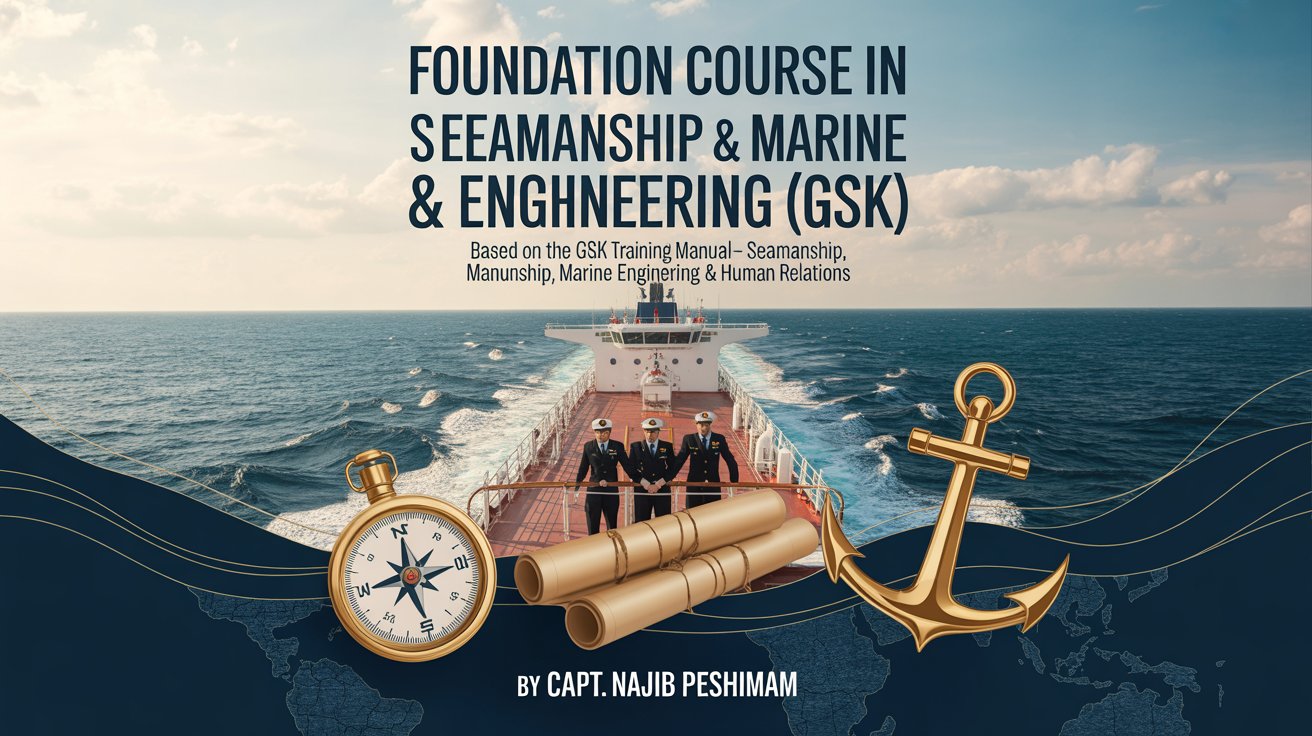GP Rating GSK Full Course with Mock Test

About Course
Course Title: Foundation Course in Seamanship & Marine Engineering (GSK)
Course Overview
The Foundation Course in Seamanship & Marine Engineering is a structured, comprehensive learning program designed for aspiring seafarers, GP Ratings, and anyone aiming to build a career in the global merchant navy. Based on the highly respected training manual published by Board of Examinations for Seafarers Trust, this course blends practical seamanship skills, technical marine engineering knowledge, and essential soft skills required to work safely and confidently at sea.
The maritime industry connects the world — and seafarers are at its heart. This course equips learners with the knowledge, discipline, and confidence to step onboard a ship and contribute effectively as part of the crew. It lays a strong foundation for deck and engine room ratings, preparing students for shipboard responsibilities, oral examinations, and life at sea.
What You Will Learn
1. Personal Development & Communication Skills
-
How to build self-discipline, teamwork, and leadership qualities essential for life at sea.
-
Mastering English communication — reading, writing, listening, and speaking in a maritime environment.
-
Managing time and stress effectively while working in challenging conditions.
-
Understanding ethical behavior, gender sensitivity, and professional conduct onboard.
2. General Aspects of Shipping
-
The role of the shipping industry in global trade.
-
Different types of ships — bulk carriers, tankers, container ships, passenger vessels, offshore support vessels, and more.
-
Types of cargo and how they are handled safely.
-
Shipboard departments (Nautical, Engineering, Catering), crew hierarchy, and roles of GP Ratings.
-
Responsibilities of a seafarer in ensuring smooth daily operations.
3. Health, Hygiene & Safety
-
Why personal health and cleanliness are vital onboard.
-
Maintaining hygiene in accommodation, galleys, and workspaces.
-
Using personal protective equipment (PPE) correctly.
-
Preventing accidents through good housekeeping and safety awareness.
-
Understanding the risks of fatigue, dehydration, and hazardous environments.
4. Nautical & Engineering Terminology
-
Familiarity with parts of the ship — hull, decks, superstructure, forecastle, poop deck, accommodation, and machinery spaces.
-
Basic engineering terms — bilge, bearings, sea chest, scuppers, WLL, and more.
-
Understanding navigational directions (port, starboard, bow, stern, amidships) and standard seamanship vocabulary.
-
Identifying mooring equipment and anchoring gear.
5. Navigation & Chart Work
-
Introduction to the world’s continents, oceans, major straits, canals, and navigable rivers.
-
Learning units of maritime measurement: nautical mile, kilometer, and knot.
-
Understanding nautical charts, symbols, and projections (Mercator).
-
Basics of fixing a vessel’s position using bearings, GPS coordinates, and chart plotting.
-
Introduction to bridge equipment: compass, radar, ECDIS, AIS, echo sounder, and VHF radio.
Why This Course Matters
A ship is a world of its own. Once at sea, every crew member must understand their duties, communicate effectively, and work as a team to ensure safety and efficiency. This course:
-
Builds a strong technical foundation for beginners in both deck and engine departments.
-
Strengthens practical seamanship skills — from handling mooring ropes to basic chart navigation.
-
Instills discipline and safety awareness, which are core values of the maritime profession.
-
Develops confidence in communication and teamwork, preparing learners to adapt to a multicultural environment onboard.
It’s not just a training course — it’s the first step into a global career.
Learning Approach
The course is designed with a hands-on and practical approach. Each chapter from the GSK Book is transformed into an easy-to-understand module:
-
Theoretical Lessons: Well-structured explanations of maritime concepts, terms, and principles.
-
Practical Sessions: Exercises and demonstrations to build shipboard familiarity.
-
Assessment Tools: Short-answer and multiple-choice questions to test understanding.
-
Interactive Activities: Chart plotting practice, vocabulary building, and teamwork exercises.
-
Communication Training: Spoken English drills, roleplays, and reporting formats.
Who Should Enroll
This course is ideal for:
-
Students aspiring to join the merchant navy as GP Ratings.
-
Beginners who want to understand basic ship operations before joining a pre-sea training program.
-
Those looking to strengthen their knowledge for oral or written examinations.
-
Seafarers seeking a refresher in seamanship, navigation, and marine engineering basics.
Learning Outcomes
By the end of this course, learners will be able to:
-
Identify and describe the key parts of a ship and their functions.
-
Understand their role as a GP Rating in the deck and engine departments.
-
Demonstrate good personal hygiene, teamwork, and safety practices onboard.
-
Read, understand, and work with nautical charts and basic navigational terms.
-
Communicate effectively in English in a shipboard environment.
-
Show awareness of maritime geography, shipping routes, and major canals and straits.
-
Display the discipline, confidence, and professionalism required at sea.
Course Duration & Format
-
Duration: Approximately 4–6 weeks (flexible)
-
Mode: Classroom / Online Hybrid
-
Modules: 5 structured chapters with assessments
-
Study Material: Digital & printed versions of the GSK Book, practice charts, vocabulary lists, and safety procedure checklists.
Final Words
A good seafarer is not born at sea — they are trained with knowledge, discipline, and courage before setting sail
This course is the perfect starting point for anyone dreaming of a maritime career. It provides the knowledge of the ship, the language of the sea, and the mindset of a sailor. With every page of the GSK Book, learners will step closer to their goal of becoming skilled, confident, and responsible seafarers — ready to face the challenges of the ocean with pride.
Course Content
Navigation
-
Chapter 5: Navigation
00:00
Student Ratings & Reviews
